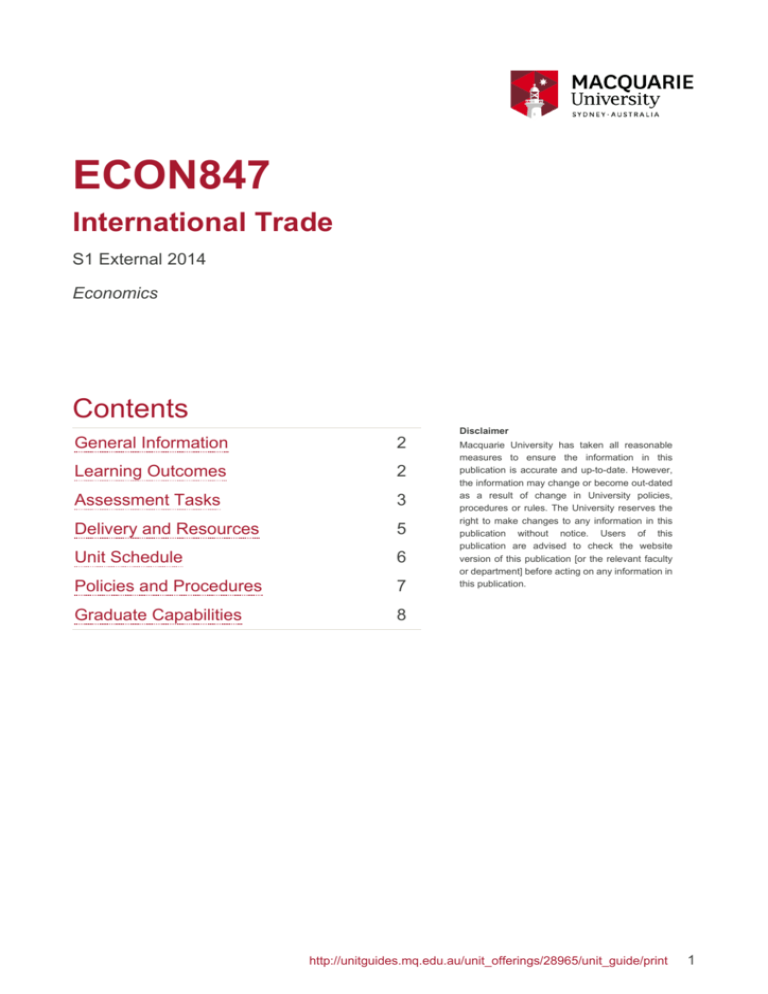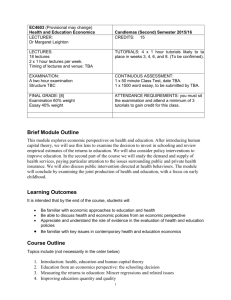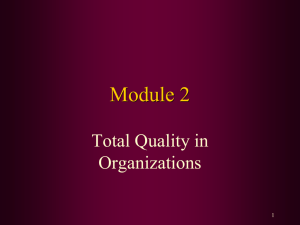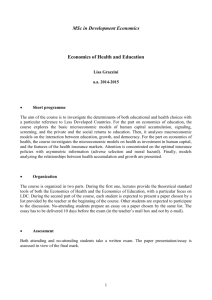
ECON847
International Trade
S1 External 2014
Economics
Contents
General Information
2
Learning Outcomes
2
Assessment Tasks
3
Delivery and Resources
5
Unit Schedule
6
Policies and Procedures
7
Graduate Capabilities
8
Disclaimer
Macquarie University has taken all reasonable
measures to ensure the information in this
publication is accurate and up-to-date. However,
the information may change or become out-dated
as a result of change in University policies,
procedures or rules. The University reserves the
right to make changes to any information in this
publication without notice. Users of this
publication are advised to check the website
version of this publication [or the relevant faculty
or department] before acting on any information in
this publication.
http://unitguides.mq.edu.au/unit_offerings/28965/unit_guide/print
1
Unit guide ECON847 International Trade
General Information
Unit convenor and teaching staff
Unit Convenor
Ha Vu
ha.vu@mq.edu.au
Contact via ha.vu@mq.edu.au
E4A 429
Laura Billington
laura.billington@mq.edu.au
Credit points
4
Prerequisites
ECON632 or ECON633 or admission to MActPrac or MCom or MEc or MIntBus prior to 2011
or admission to MIntRelMIntTrdeComLaw or MIntTrdeComLaw or PGDipIntTrdeComLaw or
PGCertIntTrdeComLaw
Corequisites
Co-badged status
NA.
Unit description
This unit examines international trade both in theory and practice. It first reviews the theories
related to inter- and intra-industry trade determination and the empirical evidence supporting
them. It then examines trade policies, covering a wide range of topics, illustrated by up-to-date
case studies. The unit has a policy approach and aims at also providing students with a good
understanding of major trade issues around the world and the effects of globalisation on trade.
It focuses on current applications of theoretical principles.
Learning Outcomes
1. Be conversant with major international trade theories.
2. Understand and appreciate current major world trade and policy issues.
3. Fully appreciate the impact of major trade issues on countries with a focus on the
tradeoffs between efficiency and equity.
4. Critically analyse, compare and examine the motives behind trade disputes.
http://unitguides.mq.edu.au/unit_offerings/28965/unit_guide/print
2
Unit guide ECON847 International Trade
Assessment Tasks
Name
Weighting
Due
Assignment
20%
6pm Friday 11 April (Week 6)
Online Trade Game
5%
6pm Friday 9 May (Week 8)
Review Essay
20%
6pm Friday 23 May (Week 10)
Final Examination
55%
Formal Examination Period
Assignment
Due: 6pm Friday 11 April (Week 6)
Weighting: 20%
The assignment will be a combination of problem solving and discussion/explanation questions.
The questions will be released on iLearn in week 5 and you will have roughly a week to complete
and submit it on ilearn by the aforementioned due date.
No extensions will be granted. Students who have not submitted the assignment by the deadline
will be awarded a mark of 0 for the task, except for cases in which an application for special
consideration is made and approved.
It is important to note that any student that submits an assignment online through turnitin that is
not their own work will be automatically be given a mark of zero. Students will also face serious
disciplinary action, which may include an automatic failure of ECON847 and the possible
exclusion from Macquarie University. Turnitin will be used extensively to determine whether the
submitted work is your own work.
This Assessment Task relates to the following Learning Outcomes:
• Be conversant with major international trade theories.
• Understand and appreciate current major world trade and policy issues.
• Fully appreciate the impact of major trade issues on countries with a focus on the
tradeoffs between efficiency and equity.
• Critically analyse, compare and examine the motives behind trade disputes.
Online Trade Game
Due: 6pm Friday 9 May (Week 8)
Weighting: 5%
This game is designed to show how trade affects a country’s prosperity. It helps you understand
how international trade works, how trade influences the development of a country and helps
http://unitguides.mq.edu.au/unit_offerings/28965/unit_guide/print
3
Unit guide ECON847 International Trade
introduce topics of international trade such as supply and demand, trading, and tariffs (in a nonacademic way).
The instruction video can be found at: http://youtu.be/I6gpUUCD530
The game platform and questions will be uploaded on ilearn in due course and you will be
informed about it.
This Assessment Task relates to the following Learning Outcomes:
• Be conversant with major international trade theories.
Review Essay
Due: 6pm Friday 23 May (Week 10)
Weighting: 20%
Write a 1600 word summary and evaluation of the given article (to be released in week 6). A
"review essay" is a summary of your own words of the article, together with an appraisal of it.
Your review essay should be about 70% summary and 30% appraisal. Summary means you
summarize the main points and explain the article in your own words. Figures, tables, or
equations in the article may not be included in your essay. Appraisal means you express your
thoughts about the article. For example, whether the article is full of insightful remarks, whether
the article gives adequate consideration/analysis of the main
issues, or if the article covers too much or too little ground, any additional aspects should be
included in the article. Your bibliography can be minimal.
Each essay must represent the student's own work. The copying of another student's essay, or
from somewhere else is clearly regarded as plagiarism. All essays MUST be submitted to
Turnitin that detects plagiarism. Cases of plagiarism will be dealt with severely. For further
information on plagiarism and how to avoid it, please refer to the Academic Honesty Policy link.
This Assessment Task relates to the following Learning Outcomes:
• Be conversant with major international trade theories.
• Understand and appreciate current major world trade and policy issues.
• Fully appreciate the impact of major trade issues on countries with a focus on the
tradeoffs between efficiency and equity.
• Critically analyse, compare and examine the motives behind trade disputes.
Final Examination
Due: Formal Examination Period
Weighting: 55%
The final exam will be held during the official Session 1 examination period. The structure of the
final examination will typically involve short and longer answer questions, which may also include
http://unitguides.mq.edu.au/unit_offerings/28965/unit_guide/print
4
Unit guide ECON847 International Trade
calculations and diagrammatical illustrations. Details on the exact examination date, the exact
nature and structure of the final examination will be provided in due course.
It is important to note that students must pass the final examination to satisfactorily complete this
unit. However, it is also important that students must complete all tasks in this course to
successfully complete this unit.
Failure to attend the final examination without approved documented evidence will result in a Fail
grade for this unit.
This Assessment Task relates to the following Learning Outcomes:
• Be conversant with major international trade theories.
• Understand and appreciate current major world trade and policy issues.
• Fully appreciate the impact of major trade issues on countries with a focus on the
tradeoffs between efficiency and equity.
• Critically analyse, compare and examine the motives behind trade disputes.
Delivery and Resources
Required and Recommended Texts and/or Materials Textbook:
Salvatore, Dominick (2012), Introduction to International Economics, Third Edition, John Wiley
and Sons.
Students who are wanting to purchase the E-Text option can do so at
http://au.wiley.com/WileyCDA/WileyTitle/productCd-EHEP002068.html
Other Useful Textbooks:
Gerber, James (2010), International Economics, 5th ed, Pearson Addison-Wesley.
Krugman, P, Obstfeld, M., and Melitz, M. (2014) International Economics: Theory & Policy,
International Trade: Theory & Policy, Prentice Hall.
Krugman, P. and Obstfeld, M. (2009), International Economics, 8th ed., Addison Wesley.
Carbaugh, R. (2005), International Economics, 10th ed., Thomson.
Husted, S. and Melvin, J. (2013), International Economics, 9th ed., Pearson Addison Wesley.
Pugel, T. (2004), International Economics, 12th ed., McGraw-Hill.
Salvatore, D. (2012), International Economics, 11th ed., Wiley.
Sawyer, W. and Sprinkle, R. (2006), International Economics, Pearson.
Van den Berg, H. (2004), International Economics, McGraw-Hill.
Yarbrough, B. and Yarbrough, R. (2006),The World Economy, 7th ed., Thomson.
http://unitguides.mq.edu.au/unit_offerings/28965/unit_guide/print
5
Unit guide ECON847 International Trade
Useful Websites:
Australian Department of Foreign Affairs and Trade, www.dfat.gov.au
Australian Bureau of Statistics, www.abs.gov.au
International Monetary Fund, www.imf.org
Organisation for Economic Cooperation and Development, www.oecd.org
The Economist, www.economist.com
The United Nations Conference on Trade and Development (UNCTAD), www.unctad.org
World Trade Organisation, www.wto.org
World Bank, www.worldbank.org
Lecture material (slides, transcripts, and video) will be posted on ilearn website. You need to
check iLearn regularly.
Unit Schedule
LECTURE TOPICS
1. There are 10 topics to be covered over the 13-week semester. Some topics are longer than
others, thus the numbering of topics below is not related to the numer of lecture weeks.
2. It is essential that students watch the video recorded for each topic on a weekly basis.
Topic 1: The Gains from Trade and Sources of Comparative Advantage
Salvatore, Chapters1&2, Gerber, Chapters 3&4.
Topic 2: Intra-Industry Trade
Salvatore, 2, 3, and 4; Gerber, Chapter 5 (pp. 93-103).
Topic 3: Trade Restrictions (1): Tariffs
Salvatore, Chapter 5; Gerber, Chapter 6.
Topic 4: Trade Restrictions (2): Non-Tariff Barriers
Salvatore, Chapter 6; Gerber, Chapter 7 (pp. 151-156), Chapter 2 (pp. 17-23, 44-45).
Topic 5: Political Economy of Trade
Salvatore, Chapter 6; Gerber, Chapter. 5 (pp.103-115), Chapter 7 (pp.140-156).
Topic 6: Trade and the Global Economy
Salvatore, Chapter 1, Lecture Notes, & Gerber, Chapter 2, Chapter. 8, Chapter 9
(pp.180-83, pp.197-205).
http://unitguides.mq.edu.au/unit_offerings/28965/unit_guide/print
6
Unit guide ECON847 International Trade
Topic 7: Trade Blocs
Salvatore, Chapter 7; Gerber, Chapter. 2 (pp. 24-28), Chapter.4 (pp.73-74), Chapter.13
(pp. 302-08, pp. 314-18, pp. 321-28, Chapter. 14 (pp. 331-38, pp. 348-59).
Topic 8: Trade and Development
Salvatore, Chapter 8; Gerber, Chapter.15 (pp. 362-371), Chapter.16&17and Lecture
Notes.
Topic 9: International Factor Movements
Salvatore, Chapter 9; Gerber, Chapter.2 (pp. 84-86), Chapter. 13 (pp. 318-20),
Chapter.14 (pp. 356-57)
Chapter. 9 (pp.186-190), Chapter.12
Topic 10: International Trade and Exchange Rate Movements
Salvatore, Chapters 10 & 11, Gerber, Chapter 10 (pp. 209-210, pp. 213-235)
Policies and Procedures
Macquarie University policies and procedures are accessible from Policy Central.
Students should be aware of the following policies in particular with regard to
Learning and Teaching:
Academic Honesty Policy http://mq.edu.au/policy/docs/academic_honesty/
policy.html
Assessment Policy http://mq.edu.au/policy/docs/assessment/policy.html
Grading Policy http://mq.edu.au/policy/docs/grading/policy.html
Grade Appeal Policy http://mq.edu.au/policy/docs/gradeappeal/policy.html
Grievance Management Policy http://mq.edu.au/policy/docs/
grievance_management/policy.html
Disruption to Studies Policy http://www.mq.edu.au/policy/docs/disruption_studies/
policy.html The Disruption to Studies Policy is effective from March 3 2014 and
replaces the Special Consideration Policy.
In addition, a number of other policies can be found in the Learning and Teaching Category of
Policy Central.
Student Code of Conduct
Macquarie University students have a responsibility to be familiar with the Student Code of
Conduct: https://students.mq.edu.au/support/student_conduct/
Student Support
Macquarie University provides a range of support services for students. For details,
visit http://students.mq.edu.au/support/
http://unitguides.mq.edu.au/unit_offerings/28965/unit_guide/print
7
Unit guide ECON847 International Trade
Learning Skills
Learning Skills (mq.edu.au/learningskills) provides academic writing resources and study
strategies to improve your marks and take control of your study.
• Workshops
• StudyWise
• Academic Integrity Module for Students
• Ask a Learning Adviser
Student Enquiry Service
For all student enquiries, visit Student Connect at ask.mq.edu.au
Equity Support
Students with a disability are encouraged to contact the Disability Service who can provide
appropriate help with any issues that arise during their studies.
IT Help
For help with University computer systems and technology, visit http://informatics.mq.edu.au/
help/.
When using the University's IT, you must adhere to the Acceptable Use Policy. The policy
applies to all who connect to the MQ network including students.
Graduate Capabilities
PG - Discipline Knowledge and Skills
Our postgraduates will be able to demonstrate a significantly enhanced depth and breadth of
knowledge, scholarly understanding, and specific subject content knowledge in their chosen
fields.
This graduate capability is supported by:
Learning outcomes
• Be conversant with major international trade theories.
• Understand and appreciate current major world trade and policy issues.
• Fully appreciate the impact of major trade issues on countries with a focus on the
tradeoffs between efficiency and equity.
• Critically analyse, compare and examine the motives behind trade disputes.
Assessment tasks
• Assignment
• Review Essay
http://unitguides.mq.edu.au/unit_offerings/28965/unit_guide/print
8
Unit guide ECON847 International Trade
• Final Examination
PG - Critical, Analytical and Integrative Thinking
Our postgraduates will be capable of utilising and reflecting on prior knowledge and experience,
of applying higher level critical thinking skills, and of integrating and synthesising learning and
knowledge from a range of sources and environments. A characteristic of this form of thinking is
the generation of new, professionally oriented knowledge through personal or group-based
critique of practice and theory.
This graduate capability is supported by:
Learning outcomes
• Be conversant with major international trade theories.
• Understand and appreciate current major world trade and policy issues.
• Fully appreciate the impact of major trade issues on countries with a focus on the
tradeoffs between efficiency and equity.
• Critically analyse, compare and examine the motives behind trade disputes.
Assessment tasks
• Assignment
• Online Trade Game
• Review Essay
• Final Examination
PG - Research and Problem Solving Capability
Our postgraduates will be capable of systematic enquiry; able to use research skills to create
new knowledge that can be applied to real world issues, or contribute to a field of study or
practice to enhance society. They will be capable of creative questioning, problem finding and
problem solving.
This graduate capability is supported by:
Learning outcomes
• Be conversant with major international trade theories.
• Understand and appreciate current major world trade and policy issues.
• Fully appreciate the impact of major trade issues on countries with a focus on the
tradeoffs between efficiency and equity.
Assessment task
• Review Essay
http://unitguides.mq.edu.au/unit_offerings/28965/unit_guide/print
9
Unit guide ECON847 International Trade
PG - Effective Communication
Our postgraduates will be able to communicate effectively and convey their views to different
social, cultural, and professional audiences. They will be able to use a variety of technologically
supported media to communicate with empathy using a range of written, spoken or visual
formats.
This graduate capability is supported by:
Assessment task
• Online Trade Game
http://unitguides.mq.edu.au/unit_offerings/28965/unit_guide/print
10




